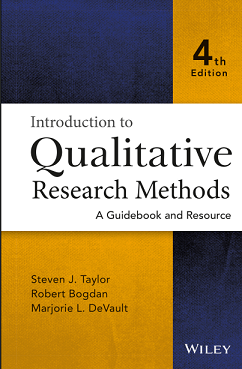
e-BOOK
Introduction to Qualitative Research Methods: a Guidebook and Resource
The term methodology refers to the way in which we approach problems and seek answers. In the social sciences, the term applies to how research is conducted. Our assumptions, interests, and purposes shape which methodology we choose. When stripped to their essentials, debates over methodology are debates over assumptions and purposes, over theory and perspective.
Two major theoretical perspectives have dominated the social science scene (Bruyn, 1966; Deutscher, 1973; also see Creswell, 2012; Saldaña, 2011).1 The first, positivism, traces its origins in the social sciences to the great theorists of the 19th and early 20th centuries and especially to Auguste Comte (1896) and Émile Durkheim (1938, 1951). The positivist seeks the facts or causes of social phenomena apart from the subjective states of individuals. Durkheim (1938, p. 14) told the social scientist to consider social facts, or social phenomena, as “things” that exercise an external influence on people.
Ketersediaan
| 156 | 001.42 | Website | Tersedia |
Informasi Detail
- Judul Seri
-
-
- No. Panggil
-
001.42
- Penerbit
- New Jersey : John Wiley & Sons, Inc., 2016
- Deskripsi Fisik
-
416 halaman
- Bahasa
-
Inggris
- ISBN/ISSN
-
978-1-118-767306
- Klasifikasi
-
001.42
- Tipe Isi
-
text
- Tipe Media
-
computer
- Tipe Pembawa
-
online resource
- Edisi
-
Fourth Edition
- Subjek
- Info Detail Spesifik
-
-
- Pernyataan Tanggungjawab
-
Steven J. Taylor, Robert Bogdan, dan Marjorie L. DeVault
Versi lain/terkait
Tidak tersedia versi lain
Lampiran Berkas
Komentar
Anda harus login sebelum memberikan komentar
 Karya Umum
Karya Umum  Filsafat
Filsafat  Agama
Agama  Ilmu-ilmu Sosial
Ilmu-ilmu Sosial  Bahasa
Bahasa  Ilmu-ilmu Murni
Ilmu-ilmu Murni  Ilmu-ilmu Terapan
Ilmu-ilmu Terapan  Kesenian, Hiburan, dan Olahraga
Kesenian, Hiburan, dan Olahraga  Kesusastraan
Kesusastraan  Geografi dan Sejarah
Geografi dan Sejarah